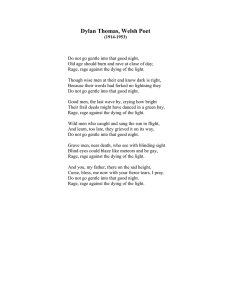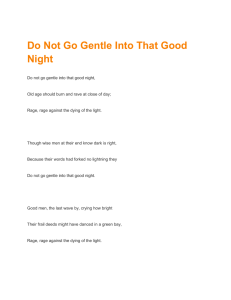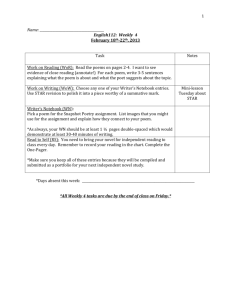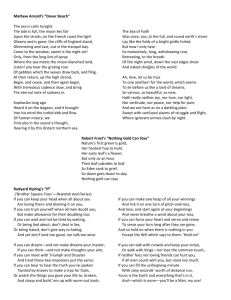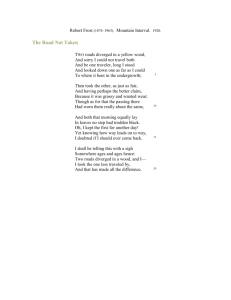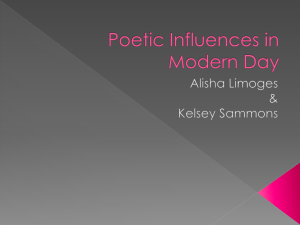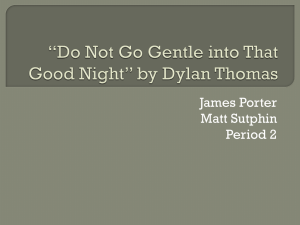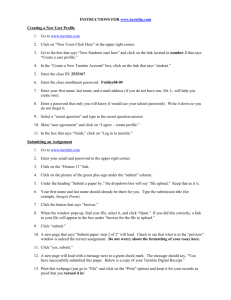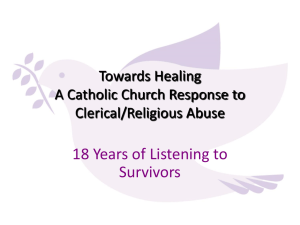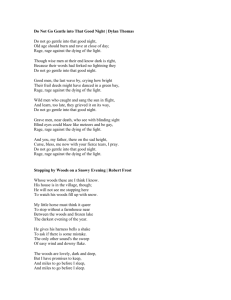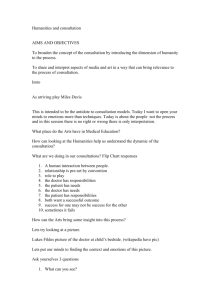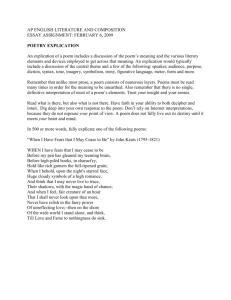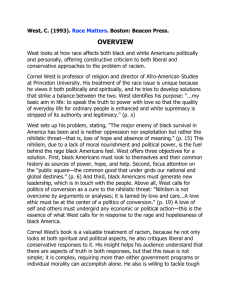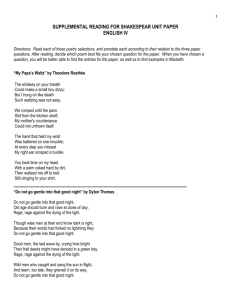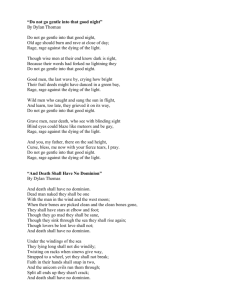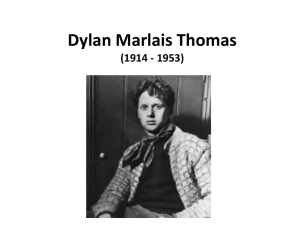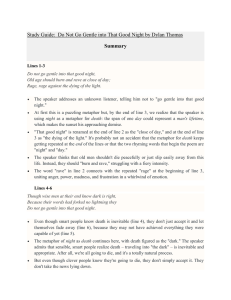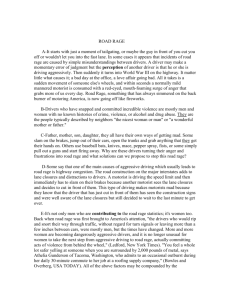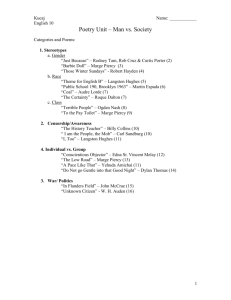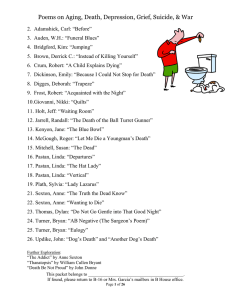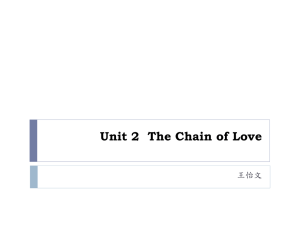Departmental An ant on the tablecloth Ran into a dormant moth Of
advertisement
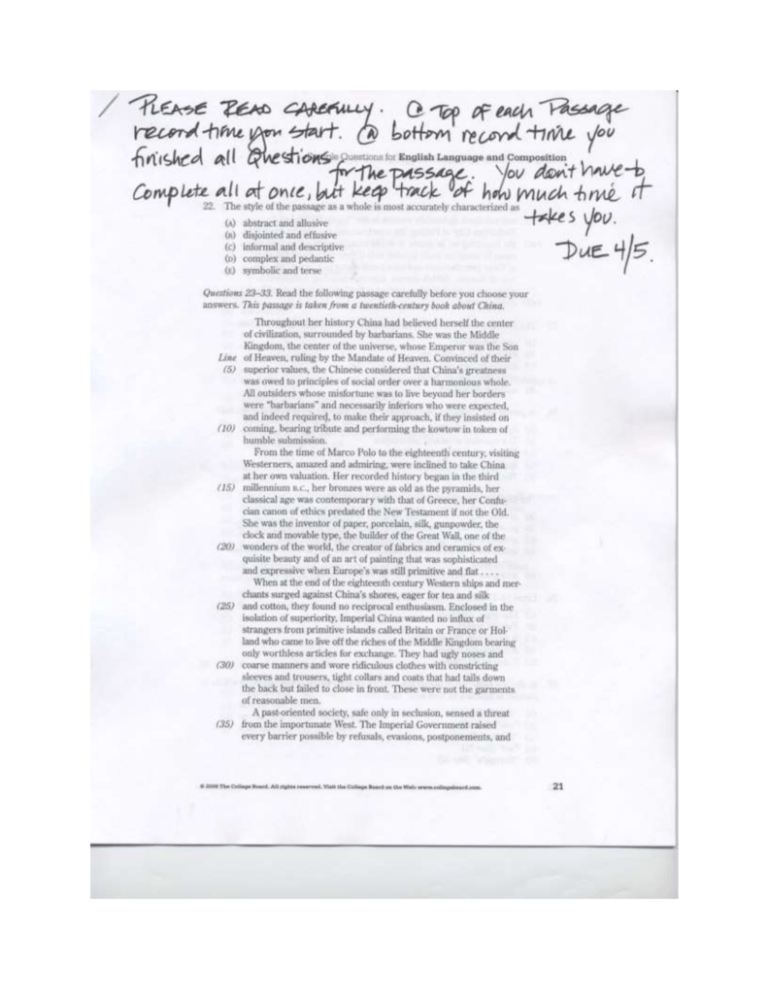
Departmental An ant on the tablecloth Ran into a dormant moth Of many times his size. He showed not the least surprise. His business wasn't with such. He gave it scarcely a touch, And was off on his duty run. Yet if he encountered one Of the hive's enquiry squad Whose work is to find out God And the nature of time and space, He would put him onto the case. Ants are a curious race; One crossing with hurried tread The body of one of their dead Isn"t given a moment's arrestSeems not even impressed. But he no doubts report to any With whom he crosses antennae, And they no doubt report To the higher up at court. Then word goes forth in Formic: "Death's come to Jerry McCormic, Our selfless forager Jerry. Will the special Janizary Whose ofice it is to bury The dead of the commissary Go bring him home to his people. Lay him in state on a sepal. Wrap him for shroud in a petal. Embalm him with ichor of nettle. This is the word of your Queen." And presently on the scene Appears a solemn mortician; And taking formal position With feelers calmlty atwiddle, Seizes the dead by the middle, And heaving him high in the air, Carries him out of there. No one stands round to stare. It is nobody else"s affair. It couldn't be called ungentle. But how thoroughly departmental. Robert Frost (18741963) 1. as A. B. C. D. E. 2. There is a shift in the poem from A. Descriptive narrative to pensive editorial B. Careful observation to personal involvement C. Omniscient description to reproachful exposition D. Individual account to universal significance E. There is no apparent shift 3. The tone of the poem can best be described as A. Playful observation B. Scornful emphasis C. Light description D. Satirical exposition E. Detached omniscience 4. A. B. C. D. E. "Arrest" in line 16 most likely means incarceration admonition capture detention seizure 5. What rhetorical strategy is exhibited in "Death's come to Jerry McCormic," (line 23) I. II. III. Personification Metaphor Euphemism A. B. C. D. E. I only II only III only I and II only None of the above 6. A. B. C. D. E. "Atwiddle " in line most likely means upright alert flaccid quiescent inquisitive 7. A. B. C. D. E. The major shift in the piece occurs in Line 8 Line 13 Line 23 Line 33 Line 42 "Departmental" can best be described The product of attentive observation An account of nature An allegory for human idiosyncrasies A light, simple narrative A reflection upon the author's life 8. The author"s depiction of ants is best described as A. indifferently mechanical B. mundanely subsistent C. hierarchically divided D. selfishly compassionless E. fantastically human 9. Lines 42-43 suggest that the author A. meant the piece to be a statement about departmental action B. holds the death practices of ants in reproach C. finds the ways in which all species treat death intriguing D. meant to place emphasis on his own opinion E. is warning the reader against judging other species against our own standards 10.What is the author's attitude toward departmental societies? A. outraged abhorrence B. interested approval C. indifferent observation D. bitter detest E. satirical disapproval DO NOT GO GENTLE INTO THAT GOOD NIGHT Do not go gentle into that good night, Old age should burn and rave at close of day; Rage, rage against the dying of the light. Though wise men at their end know dark is right, Because their words had forked no lightning they Do not go gentle into that good night. Good men, the last wave by, crying how bright Their frail deeds might have danced in a green bay, Rage, rage against the dying of the light. Wild men who caught and sang the sun in flight, And learn , too late, they grieved it on its way Do not go gentle into that good night. Grave men, near death, who see with blinding sight Blind eyes could blaze like meteors and be gay, Rage, rage against the dying of the light. And you, my father, there on the sad height, Curse, bless, em now with your fierce tears, I pray. Do not go gentle into that good night. Rage, rage against the dying of the light. 1. Which of the following IS NOT an attitude one of the men displays? a. resistingly aware b. unexpected melancholia c. determined rage d. wistful regret e. solemn objectivity 2. The most important shift in the passage occurs in a. line 16 b. line 4 c. line 10 d. both a and b e. none of the above 3. How does the author suggest one should meet death? a. prayerful acceptance b. challenging preparedness c. solemn resistance d. amiable resignation e. angry opposition 4. Where does the author reveal his ambiguity toward his father and his impending death? a. the various characterizations of men b. line 17 - "Curse, bless..." c. "...dying of the light" d. "...your fierce tears..." e. reference to death as "that good night" 5. Personification is NOT exhibited in which of the following? a. "Their frail deeds might have danced in a green bay," (line 8) b. "Old age should burn and rave at close of day;" (line 2) c. "Rage, rage against the dying of the light." (line 3) d. "Blind eyes could blaze like meteors and be gay," (line 14) e. "Wild men who caught and sang the sun in flight," (line10)
